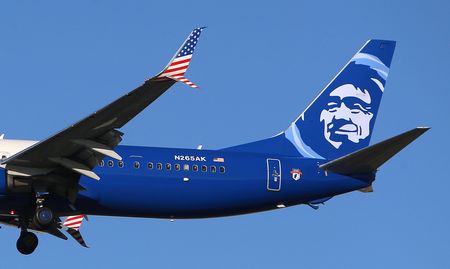(Reuters) -Alaska Air Group, the operator of the Boeing plane that suffered a mid-air incident earlier this month, said on Thursday it expects a $150-million profit hit in 2024 from the more-than-two-week-long grounding of 737 MAX 9 aircraft.
Earlier this month, an Alaska 737 MAX 9 aircraft was forced to make an emergency landing after a cabin panel fell off during a flight full of passengers. The Federal Aviation Administration subsequently grounded over 170 MAX 9 jets across carriers.
Including the impact, the airline forecast 2024 adjusted earnings per share to be between $3.00 and $5.00. Analysts polled by LSEG had expected a profit of $4.93 this year.
Alaska also cast doubt on its capacity growth target of 3% to 5% this year, saying: “Given the grounding, and the potential for future delivery delays, the Company expects capacity growth to be at or below the lower end of this range.”
The airline swung to a fourth-quarter loss, from a year-ago profit, hurt by an increase in fuel and labor expenses.
The U.S. aviation regulator lifted the grounding on Wednesday, but also barred Boeing from expanding production of its best-selling 737 MAX narrowbody planes, which is expected to have wide-ranging effects across the industry.
Alaska executives are set to address investors and analysts later in the day. The airline placed orders for 42 737-10 and 10 737-9 jets in 2022, as part of a plan to sunset Airbus aircraft by the end of 2023.
Alaska and United Airlines together account for 70% of Boeing’s MAX 9 fleet and had been forced to cancel thousands of flights in the wake of the incident.
Alaska said it expects to bring the first few planes back into service on Friday and that it discovered and immediately corrected a minor fault on one 737-900ER plane after an FAA-recommended inspection as part of its scrutiny of Boeing.
The groundings had no impact on the company’s results for the October-December quarter, during which its revenue rose nearly 3%, to $2.55 billion, due to strong travel demand.
However, an increase in labor and fuel-related costs pushed Alaska to a loss of $2 million, or 2 cents per share for the quarter, from a profit of $22 million, or 17 cents per share, a year ago.
(Reporting by Mehr Bedi and Abhijith Ganapavaram in Bengaluru; Editing by Pooja Desai)
